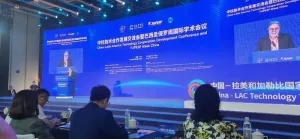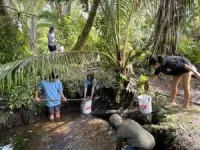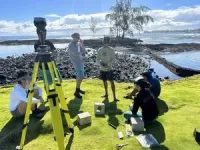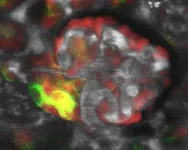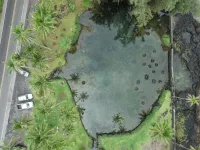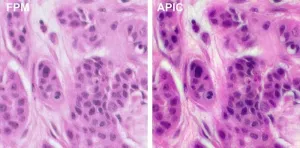(Press-News.org) The official opening ceremony of FAPESP Week China was held on Friday (June 28) in the city of Dongguan, Guangdong Province. Organized in partnership with the China-Lac Technology Transfer Center (CLTTC), the event brought together political, diplomatic and academic leaders from both countries and also marked the start of the Conference on Technology Exchange and Development of China-Latin America Cooperation.
“On behalf of the Department of International Cooperation of the Ministry of Science and Technology of the People’s Republic of China, I welcome the guests and congratulate the organizers. All friends who share the same mission are not separated by geographical distance. China and Brazil are strategic partners. China sees Brazil as a strategic partner in science. We have pragmatic cooperation in aeronautics, medicine, health and other fields,” said Zhuang Jia, deputy director of the International Cooperation Department of the Chinese Ministry of Science and Technology.
Jia stressed that the current era faces a huge challenge, and China is focusing on deep cooperation in science and technology, seeking to develop an open environment for cooperation with Latin American countries. “China’s Ministry of Science and Technology will make efforts to promote a platform for cooperation, network building and win-win technology cooperation. We have important guests here. With your support, we will contribute to a brighter future,” he added.
Fu Gui, an advisor to the Chinese Science and Technology Exchange Center, then pointed out that despite their geographical distance, China and Brazil enjoy a relationship based on equality and mutual respect. “They’re good friends with common interests, and scientific and technological cooperation is a crucial part of that relationship. Holding this major event shows our willingness to promote bilateral relations,” he said.
According to Gui, China and Brazil are large developing countries that share many characteristics, abundant resources and vast market opportunities. “There’s complementarity. We hope to collaborate in more sectors, such as climate change, food security and global technology governance, in order to create a fairer and safer environment.”
The inspector of the Science and Technology Department of Guangzhou Province, Gong Jianwen, said that Guangzhou, with 127 million inhabitants and a gross domestic product (GDP) of more than 13 trillion Yuan (almost R$ 10 trillion), is a strategic region because it has a strong capacity for innovation, a favorable business environment, an important role in industry and, like São Paulo, is the engine of national economic development.
“Dongguan has a similar climate to Latin America, which is an important trading partner and significant investment destination for Guangzhou. There’s vast potential for scientific cooperation in areas such as biomass energy, electric vehicles, climate change, clean energy, agriculture, health, pharmaceuticals and aeronautics,” he noted. “Peace and development are common themes around the world. Looking to the future, we hope to collaborate with Latin America with an even more open attitude, promoting innovative cooperation for mutual benefit. To contribute wisely to shared prosperity.”
Afterwards, the Consul General of Brazil in Guangzhou, Alan Coelho de Séllos, pointed out that the state of São Paulo has always emerged as a pole of leadership in all the important moments of Brazil’s history, since independence. “And in the field of international and scientific cooperation, it has set another example to the other units of the Brazilian federation by sending this prestigious mission from its Research Support Foundation. By choosing the very important province of Guangzhou as a destination, they’re opening up prospects for greater mutual knowledge between Brazil’s main state and China’s richest province. The cradle and starting point of the Silk Road, the first and most cosmopolitan of China’s ports, Guangzhou has become the factory of the world, the center of high-tech development in the innovative fields of new energies and electric cars,” he stated.
According to Séllos, Brazil has much to gain from a partnership with China. “Since 2015, Brazil and China have been working together in areas such as biotechnology, nanotechnology and renewable energy. The promising future of this partnership depends on continuous and collaborative efforts. The FAPESP mission present here today is an excellent example for all units of the Brazilian federation,” he added.
In his speech, Carlos Américo Pacheco, Executive Director for FAPESP’s Executive Board, said that China is now recognized as a superpower in the field of science and technology. It plays an extraordinary role in the world, in countless areas of knowledge and technology. On the other hand, he pointed out that São Paulo is a state in the Brazilian federation that accounts for a third of the country’s GDP and 40% of its scientific production. “It’s a special place in Brazil, with links to all the other regions of the country. It has high-quality institutions, renowned researchers and innovative companies in significant numbers,” he emphasized.
“Certainly, in the coming months, we’ll detail initiatives and joint calls in various areas of science, technology and innovation. Cooperation between Brazil and China can respond to strategic challenges for both countries. China has extraordinary scientific and technological potential. And there are many complementarities with what we’re doing in Brazil and can do together,” he highlighted. “The world in the coming years will be inexorably driven by the challenge of technological advances in countless areas, whether in artificial intelligence, quantum technologies, materials, adaptation to climate change or genomics. And there’s a lot of room for cooperation between Brazil and China, a lot of synergy. The distance between the countries is great, and language is another obstacle. But if we look back and see what has been built in the area of space, satellites, we can see that it’s quite possible if there’s mutual trust and confidence that this cooperation will be constructive for both countries,” said Pacheco.
The vice-president of the National Natural Science Foundation of China (NSFC), Zhang Yongtao, recalled that the organization he represents already has agreements with the main Brazilian funding agencies, including FAPESP, and pointed to the area of agriculture as the next “crucial sector” for collaboration with Brazilian partners.
The event was hosted by the vice-president of Dongguan University of Technology, Yongjun Xu. Also present was FAPESP’s scientific director, Marcio de Castro Silva Filho, and Dongguan’s deputy mayor, Li Jun.
FAPESP Week China was organized in partnership with the CLTTC, a technology transfer center for Latin American and Caribbean countries that opened in Dongguan, Guangzhou Province, China in June 2023. One of the center’s objectives is to help build a platform that serves both the country’s diplomatic work and promotes economic development, exchanges, cooperation in science and technology and technological innovation, and technology transfer between China and Latin American and Caribbean countries.
In December 2023, FAPESP and the CLTTC signed an agreement aimed at promoting scientific and technological collaboration between researchers associated with the Chinese organization and universities and research institutions in the state of São Paulo through the joint funding of projects.
END
Opening of FAPESP Week China brings together academic, political and diplomatic leaders in Dongguan
Participants emphasized their desire to strengthen scientific and technological cooperation between Brazil and China and celebrated the friendly relations between the two countries
2024-06-28
ELSE PRESS RELEASES FROM THIS DATE:
To regenerate the kidney, please don’t pass the salt
2024-06-28
A loss of salt and body fluid can stimulate kidney regeneration and repair in mice, according to a NIH-funded study led by USC Stem Cell scientist Janos Peti-Peterdi and published in The Journal of Clinical Investigation. This innate regenerative response relies on a small population of kidney cells in a region known as the macula densa (MD), which senses salt and exerts control over filtration, hormone secretion, and other key functions of this vital organ.
“Our personal and professional mission is to find a cure for kidney disease, a growing global epidemic affecting one out of seven adults, which translates ...
Enhancing nasal endoscopy with AI
2024-06-28
A team of researchers from Ochsner Health recently published an insightful article in the International Forum of Allergy & Rhinology exploring the application of convolutional neural networks (CNNs) to improve the accuracy and efficiency of nasal endoscopy. The study, authored by resident physician Dr. Vinayak Ganeshan under the guidance of senior otolaryngologist Dr. Edward D. McCoul, addresses the challenges posed by the intricate nasal cavity anatomy in rhinology diagnostics.
Nasal endoscopy (NE) is an essential diagnostic tool in rhinology, but its effectiveness can be hampered by the complex ...
Drone technology aid restoration, resilience of Native Hawaiian fishponds
2024-06-28
Scientists and kiaʻi loko (fishpond practitioners) have a new tool to aid their efforts to restore and ensure the resilience of Native Hawaiian fishponds. Researchers from the University of Hawai‘i (UH) and fishpond stewards in Hilo, Hawai‘i recently published a study in the Journal of Remote Sensing highlighting the use of uncrewed aerial vehicles (UAVs) to support integrated coastal zone management, including at cultural heritage sites.
“We discovered that drones are effective and cost-efficient ...
New computational microscopy technique provides more direct route to crisp images
2024-06-28
For hundreds of years, the clarity and magnification of microscopes were ultimately limited by the physical properties of their optical lenses. Microscope makers pushed those boundaries by making increasingly complicated and expensive stacks of lens elements. Still, scientists had to decide between high resolution and a small field of view on the one hand or low resolution and a large field of view on the other.
In 2013, a team of Caltech engineers introduced a microscopy technique called FPM (for ...
11th-grade student wins competition with research conducted at UTA
2024-06-28
A Plano high school student conducting research in a University of Texas at Arlington chemistry professor’s lab earned multiple awards at the annual Regeneron International Science and Engineering Fair (ISEF). Regeneron ISEF is the world’s largest pre-college STEM competition for students in grades 9-12.
Chloe Lee, a junior in the International Baccalaureate program at Plano East Senior High School, conducted research in the lab of Junha Jeon, associate professor of chemistry and ...
Deep learning-assisted lesion segmentation in PET/CT imaging: A feasibility study for salvage radiation therapy in prostate cancer
2024-06-28
“The deployment of DL segmentation methods in 18F-fluciclovine PET/CT imaging represents an intriguing research direction for precision medicine in salvage prostate cancer care.”
BUFFALO, NY- June 28, 2024 – A new editorial paper was published in Oncoscience (Volume 11) on May 20, 2024, entitled, “Deep learning-assisted lesion segmentation in PET/CT imaging: A feasibility study for salvage radiation therapy in prostate cancer.”
In this new editorial, researchers Richard L.J. Qiu, Chih-Wei Chang, ...
Dementia cost calculator will provide precise, annual, national estimates of Alzheimer's financial toll
2024-06-28
An A-list of researchers from across USC is building a dementia cost model that will generate comprehensive national, annual estimates of the cost of dementia that could benefit patients and their families, thanks to a five-year, $8.2 million federal grant from the National Institute on Aging.
A firm grip on the costs of the disease could assist families living with dementia with planning their budgets and support needs, inform treatment and caregiving options, and help shape health care policy.
“We currently have estimates for a particular ...
Moffitt researchers develop synthesis method to enhance access to cancer-fighting withanolides
2024-06-28
TAMPA, Fla. — Withanolides, a class of naturally occurring compounds found in plants, have long been a focus of cancer research due to their ability to inhibit cancer cell growth, induce cell death and prevent metastasis. These compounds are important in developing new cancer treatments. However, the difficulty of obtaining enough of these compounds from plants has hindered research and therapeutic development.
Moffitt Cancer Center researchers have developed a groundbreaking method for the scalable synthesis of withanolides. This innovative approach, published in Science Advances, could revolutionize cancer research by providing ...
Analysis of NASA InSight data suggests Mars hit by meteoroids more often than thought
2024-06-28
PROVIDENCE, R.I. [Brown University] — NASA’s Mars InSight Lander may be resting on the Red Planet in retirement, but data from the robotic explorer is still leading to seismic discoveries on Earth.
In one of the latest studies using data from the spacecraft, an international team of scientists led by a Brown University researcher found that Mars may be getting bombarded by space rocks at more frequent rates than previously thought. Impact rates could be two to 10 times higher than previously estimated, depending on the size of the meteoroids, according to the study published in Science Advances.
“It’s ...
Serotonin 2C receptor regulates memory in mice and humans – implications for Alzheimer’s disease
2024-06-28
Researchers at Baylor College of Medicine, the University of Cambridge in the U.K. and collaborating institutions have shown that serotonin 2C receptor in the brain regulates memory in people and animal models. The findings, published in the journal Science Advances, not only provide new insights into the factors involved in healthy memory but also in conditions associated with memory loss, like Alzheimer’s disease, and suggest novel avenues for treatment.
“Serotonin, a compound produced by neurons in the midbrain, acts as a neurotransmitter, passing messages between brain cells,” said co-corresponding author Dr. Yong Xu, professor of pediatrics ...
LAST 30 PRESS RELEASES:
Climate policy support is linked to emotions - study
New method could reveal hidden supermassive black hole binaries
Novel AI model accurately detects placenta accreta in pregnancy before delivery, new research shows
Global Physics Photowalk winners announced
Exercise trains a mouse's brain to build endurance
New-onset nonarteritic anterior ischemic optic neuropathy and initiators of semaglutide in US veterans with type 2 diabetes
Availability of higher-level neonatal care in rural and urban US hospitals
Researchers identify brain circuit and cells that link prior experiences to appetite
Frog love songs and the sounds of climate change
Hunter-gatherers northwestern Europe adopted farming from migrant women, study reveals
Light-based sensor detects early molecular signs of cancer in the blood
3D MIR technique guides precision treatment of kids’ heart conditions
Which childhood abuse survivors are at elevated risk of depression? New study provides important clues
Plants retain a ‘genetic memory’ of past population crashes, study shows
CPR skills prepare communities to save lives when seconds matter
FAU study finds teen ‘sexting’ surge, warns of sextortion and privacy risks
Chinese Guidelines for Clinical Diagnosis, Treatment, and Management of Cirrhosis (2025)
Insilico Medicine featured in Harvard Business School case on Rentosertib
Towards unlocking the full potential of sodium- and potassium-ion batteries
UC Irvine-led team creates first cell type-specific gene regulatory maps for Alzheimer’s disease
Unraveling the mystery of why some cancer treatments stop working
From polls to public policy: how artificial intelligence is distorting online research
Climate policy must consider cross-border pollution “exchanges” to address inequality and achieve health benefits, research finds
What drives a mysterious sodium pump?
Study reveals new cellular mechanisms that allow the most common chronic cardiac arrhythmia to persist in the heart
Scientists discover new gatekeeper cell in the brain
High blood pressure: trained laypeople improve healthcare in rural Africa
Pitt research reveals protective key that may curb insulin-resistance and prevent diabetes
Queen Mary research results in changes to NHS guidelines
Sleep‑aligned fasting improves key heart and blood‑sugar markers
[Press-News.org] Opening of FAPESP Week China brings together academic, political and diplomatic leaders in DongguanParticipants emphasized their desire to strengthen scientific and technological cooperation between Brazil and China and celebrated the friendly relations between the two countries
